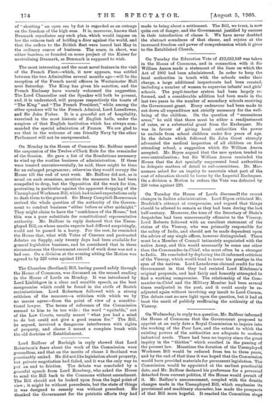• On Monday in the House of Commons Mr. Balfour
moved the suspension of the Twelve o'Clock Rule for the remainder of the Session. He gave a list of the Resolutions necessary to wind up the routine business of administration. If these were treated uncontroversially, he said, there might be time for an enlarged programme ; otherwise they would occupy the House till the end of next week. Mr. Balfour did not, as is usual on such occasions, mention the measures he had been compelled to drop, but the Opposition did the work for him, protesting in particular against the apparent dropping of the Unemployed Workmen Bill, which had raised expectations only to dash them to the ground. Sir Henry Campbell-Bannerman revived the whole question of the authority of the Govern- ment to conduct business "either before or after midnight." They might claim to have the "confidence of the House," but this was a poor substitute for constitutional representative authority. Mr. Balfour in reply declared that the Unem- ployed Bill, on whose merits experts had differed surprisingly, could not be passed in a hurry. For the rest, he reminded the House that, what with Votes of Censure and protracted debates on Supply, only twenty days had been available for general legislative business, and he considered that in these circumstances the Government record of work done was not a bad one. On a division at the evening sitting the Motion was agreed to by 223 votes against 119.






































 Previous page
Previous page